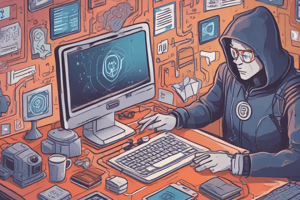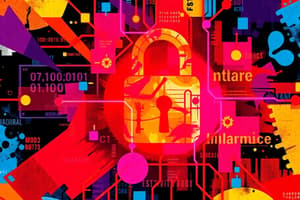Podcast
Questions and Answers
What is the definition of the internet?
What is the definition of the internet?
- A network exclusively for government use
- A system that restricts access to information
- A physical highway for information exchange
- An information superhighway where anyone can access and share information (correct)
What is the primary purpose of spyware?
What is the primary purpose of spyware?
- To replicate itself and transfer to other computers
- To steal personal information and identities
- To monitor and track user activities (correct)
- To send advertisements to users
What is the difference between a virus and a Trojan?
What is the difference between a virus and a Trojan?
- A virus replicates itself, while a Trojan disguises as a useful program (correct)
- A virus is a malicious program, while a Trojan is a useful program
- A virus is used for cyberbullying, while a Trojan is used for identity theft
- A virus steals personal information, while a Trojan sends advertisements
What is the primary goal of phishing?
What is the primary goal of phishing?
What is the purpose of ransomware?
What is the purpose of ransomware?
What is the difference between cyberbullying and cyberstalking?
What is the difference between cyberbullying and cyberstalking?
Flashcards are hidden until you start studying
Study Notes
Internet and Cybersecurity
- Internet: a global network allowing anyone to access, share, and retrieve information.
Cybercrimes
- Cyberbullying: intentional abuse, harassment, and mistreatment of others using electronic communication.
- Cyber Stalking: criminal practice of stalking or harassing individuals or groups using electronic communication.
Identity Theft
- Crime of stealing personal information to assume someone's identity for fraudulent transactions.
Malware
- Virus: malicious program that replicates itself and transfers between computers through various mediums.
- Trojan: malicious program disguised as useful software, allowing hackers to access personal information.
- Spyware: program running in the background, monitoring user activity and keystrokes through keylogging.
- Adware: program designed to display unwanted advertisements, often as pop-ups.
- Ransomware: malicious software that threatens to publish or blocks access to data unless a ransom is paid.
Online Threats
- Spam: unwanted emails, often from bots or advertisers, that can be used to send malware.
- Phishing: unwanted acquisition of sensitive personal information, such as passwords and credit card details.
Studying That Suits You
Use AI to generate personalized quizzes and flashcards to suit your learning preferences.




